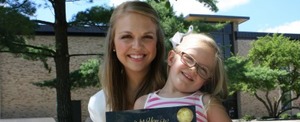My reading life: Kristen Collett-Schmitt
Published: July 29, 2014 / Author: Christine Cox

Summers with her grandmother helped nurture Kristen Collett-Schmitt’s love of reading. “She forced us grandkids to watch documentaries and made us read books,” says Collett-Schmitt, an associate professional specialist in finance at Mendoza. “Before she passed away, she specified which books went to each grandchild. She left me 50-70 books about the Kennedys and some books about the Civil War. Her notes are in the margins, and it’s incredible to see them there.”
Collett-Schmitt joined Notre Dame in 2008, and teaches economics courses to students in the undergraduate, Master of Nonprofit Administration (MNA) and Executive MBA programs. She received the Outstanding Teacher Award for the MNA program in 2013 and the Reverend Edmund Joyce, C.S.C., Award for Excellence in Undergraduate Teaching in 2014.
In this Q&A, Collett-Schmitt explains, above all, about how reading connects her with her family members.
What are you reading now?
Right now, I am reading Think Like a Freak by Steven Levitt and Stephen Dubner and The Fault in Our Stars by John Green.
What do you read regularly?
I regularly read digital versions of The New York Times and The Wall Street Journal for classroom prep, Slate Magazine for my daily dose of pop culture, and Cincinnati.com to stay informed on my hometown. I also frequent the Freakonomics blog and Marginal Revolution, another economics blog.
My husband and I share a unique tradition since we’ve been married when it comes to the Sunday National Edition of The New York Times – and it only works with the print edition. He’s a graphic designer and I am an economist, so on Sunday morning we make coffee and split the paper. I usually start with the main section and literally rip out articles for classroom prep, and he takes the Arts & Leisure section and does the same when he sees something that inspires his work. Then, we switch (whatever is left of it!). Now that we have a 4-year-old, it often takes us an entire week to get through the whole Sunday edition.
What kinds of things do you like to read in general?
I love to read about other people, and mostly fiction. My favorite fiction characters are Owen Meany from John Irving’s A Prayer for Owen Meany and Scout from To Kill a Mockingbird by Harper Lee. Likewise, I consider both of these books absolute literary treasures – not just for their characters, but because of their shared messages about friendship, social justice and faith. In fact, To Kill a Mockingbird is such an important book to both my husband and me (dating back to when we first read the book in high school), that we named our firstborn daughter Harper.
While I prefer fiction, I actually find it difficult to read fiction during the academic year because of how much nonfiction reading I do to keep my classes current, interesting and applicable to real life. So, after my summer class ends, I make it a priority to indulge in a fiction book that I literally have been saving up for all academic year. This summer, it’s The Fault in Our Stars. When I occasionally pick up a nonfiction book during my summers, it’s about the Kennedy family. I absolutely know this interest came from my late grandmother, who (for lack of a better word) was obsessed with their intrigue. Last summer, I read Jacqueline Kennedy: Historic Conversations on Life with John F. Kennedy by Michael Beschloss. It included a CD of Jackie speaking about her life with JFK, and I liked not only hearing her voice, but also hearing what she was doing in the background.
Are there books every Notre Dame business student should read?
I have two recommendations:
1) Brain Rules by John Medina. In this book, Medina describes significant neuroscience research on how brains work. I was first exposed to this book as a new college professor to help my students learn and remember better. Two of Medina’s rules that I try to incorporate into literally everything I do (even parenting) include, “We don’t pay attention to boring things” and “Repeat to remember.” I believe these rules can be used in any profession to really have impact.
2) The Freakonomics trilogy written by Steven Levitt and Stephen Dubner. When I tell people that I am an economist, the most common response I get is, “I hated that class in college.” My philosophy is that if students just give economics a chance, they will actually see how real and useful it is, especially for the non-economist. While controversial with some of its topics, Freakonomics is undoubtedly a fantastic way to give economics the chance it deserves. This, of course, is why I use the series in all of my courses.
What are your favorite books? What do you like about them?
Other than To Kill a Mockingbird and A Prayer for Owen Meany, other pieces of literature that I consider absolute treasures include a series of original copies of The Journal of Law and Economics that were given to me by a grad school professor. Some of these journals date back to the 1950s and contain seminal pieces of economic literature. I treasure their old-time look and feel, given that almost every journal I read today is electronic.
I also adore the children’s book On the Night You Were Born by Nancy Tillman. I read this book to my daughter on the eve of her birthday every year, and it never fails to bring tears to my eyes. Not only is the story touching, but Harper was an identical twin with our daughter Mackenzie, who was stillborn. So when I read that book to Harper, I talk about Mackenzie because I want Harper to have a connection to her.
/news_and_events/news_articles/article/14495/my-reading-life-kristen-collett-schmitt




